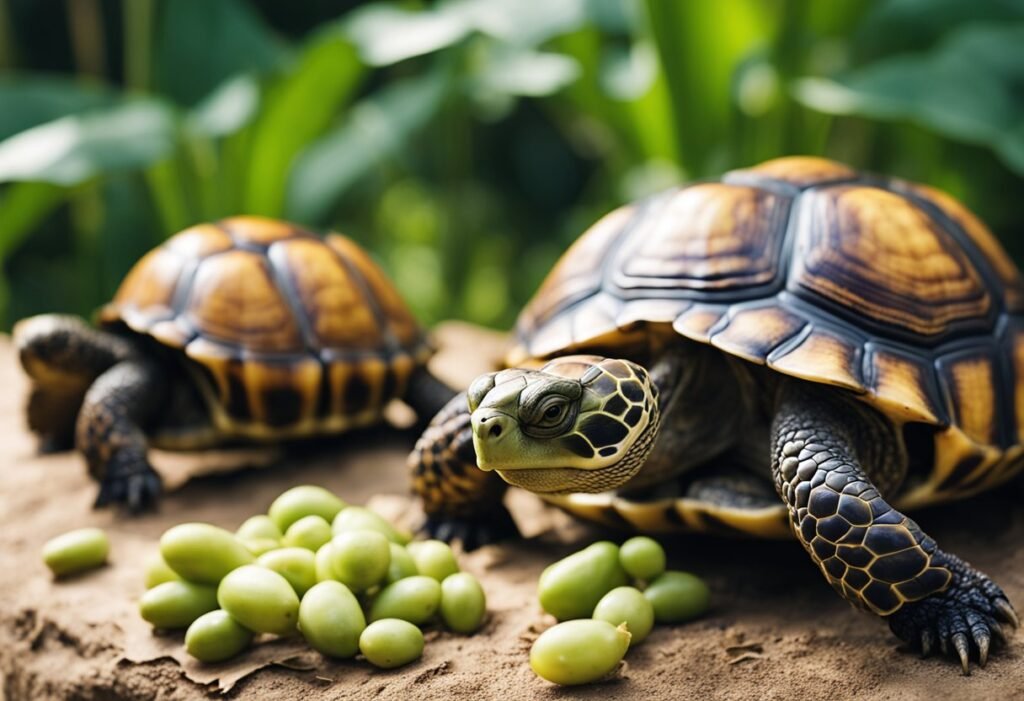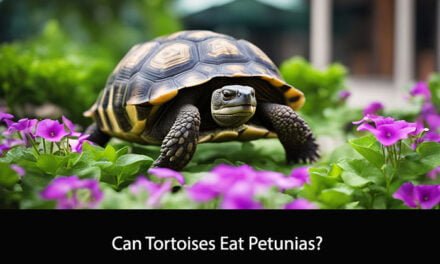Tortoises are known for their slow pace and long lifespan. As herbivores, they require a diet rich in fiber and low in protein. However, many tortoise owners may wonder if they can feed their pet eggplant. In this article, we will explore whether eggplant is a suitable addition to a tortoise’s diet.
Eggplant, also known as aubergine, is a popular vegetable in many cuisines around the world. It is a good source of vitamins and minerals, including vitamin C, potassium, and folate. However, not all vegetables are safe for tortoises to eat. Some may be toxic or cause digestive issues. Therefore, it is important to know whether eggplant is safe for tortoises before adding it to their diet.
In this article, we will discuss the nutritional value of eggplant and its potential benefits and risks for tortoises. We will also provide guidelines on how to safely incorporate eggplant into a tortoise’s diet, if it is deemed safe. By the end of this article, you will have a better understanding of whether eggplant can be a healthy addition to your tortoise’s diet.
Understanding Tortoises’ Diet

Tortoises are herbivores, which means that their diet consists mainly of plant-based foods. They require a diet that is high in fiber and low in protein and fat. Providing the right kind of food is essential for their health and well-being.
Some common foods that tortoises can eat include leafy greens, such as kale, collard greens, and dandelion greens. They can also eat vegetables such as carrots, bell peppers, and squash. Fruits such as strawberries, apples, and bananas can also be given as treats, but should not be the main part of their diet.
It’s important to note that not all plants are safe for tortoises to eat. Some plants, such as rhubarb, avocado, and tomato leaves, can be toxic to tortoises and should be avoided.
When feeding tortoises, it’s important to provide a variety of foods to ensure they are getting all the necessary nutrients. A balanced diet can be achieved by offering a mix of different greens and vegetables, as well as supplements such as calcium and vitamin D3.
In conclusion, understanding tortoises’ diet is crucial for their health and well-being. Providing a balanced diet that includes a variety of plant-based foods is essential. Always research and ensure that the plants you are feeding your tortoise are safe for consumption.
Can Tortoises Eat Eggplant?
Eggplant is a popular vegetable in many cuisines around the world. However, when it comes to feeding tortoises, it’s important to consider whether eggplant is a safe and healthy option for them.
After researching this topic, we have found that eggplant is safe for tortoises to eat in moderation. However, it should not be a staple food in their diet.
Eggplant contains solanine, a toxic substance that can be harmful to tortoises if consumed in large quantities. Therefore, it’s recommended to feed eggplant to tortoises only as an occasional treat.
In addition to solanine, eggplant is also high in oxalic acid, which can bind with calcium and prevent its absorption. This can be problematic for tortoises, as they require calcium for healthy shell growth and overall health.
If you do choose to feed eggplant to your tortoise, it’s important to prepare it properly. Raw eggplant is difficult for tortoises to digest, so it should be cooked before feeding. You can boil or steam the eggplant, or even bake it in the oven.
Overall, while eggplant can be a safe and healthy addition to a tortoise’s diet, it should be fed in moderation and prepared properly to ensure that it doesn’t cause any harm to your pet.
Nutritional Value of Eggplant

Eggplant is a vegetable that is low in calories, but high in nutrients. It is a good source of fiber, potassium, and vitamins B1, B6, and K. It also contains small amounts of other vitamins and minerals.
Here are some of the key nutrients found in eggplant:
- Fiber: Eggplant is a good source of dietary fiber, which can help promote digestive health and regulate blood sugar levels.
- Potassium: Eggplant is a good source of potassium, an essential mineral that helps regulate blood pressure and support heart health.
- Vitamin B6: Eggplant is a good source of vitamin B6, which is important for brain development and function.
- Vitamin K: Eggplant is a good source of vitamin K, which is important for blood clotting and bone health.
Overall, eggplant is a healthy and nutritious vegetable that can be a great addition to a balanced diet.
Possible Risks of Eggplant for Tortoises
Eggplant is a fruit that belongs to the nightshade family, and it contains a variety of chemical compounds that may pose a risk to tortoises. While eggplant is not toxic to tortoises, it is important to understand the potential risks associated with feeding eggplant to your tortoise.
Chemical Components
Eggplant contains a variety of chemical compounds that may be harmful to tortoises if consumed in large quantities. One of these compounds is solanine, which is a toxin that can cause digestive issues, including vomiting and diarrhea. Solanine is found in the leaves, stems, and unripe fruit of the eggplant, but it is typically not present in significant quantities in ripe fruit.
Another chemical component found in eggplant is oxalates. Oxalates are compounds that can bind to calcium in the body, potentially leading to the formation of kidney stones. While tortoises are generally able to tolerate moderate amounts of oxalates, excessive consumption of eggplant could increase the risk of kidney stone formation.
Digestive Issues
Feeding eggplant to tortoises can also lead to digestive issues. Eggplant is high in fiber, which can be difficult for tortoises to digest. If your tortoise consumes too much eggplant, it may experience bloating, gas, and other digestive issues.
In addition, eggplant is a relatively high source of potassium. While potassium is an important nutrient for tortoises, excessive consumption of potassium can lead to hyperkalemia, a condition that can cause muscle weakness, heart arrhythmias, and other health issues.
In conclusion, while eggplant is not toxic to tortoises, it is important to be aware of the potential risks associated with feeding eggplant to your tortoise. If you do choose to feed your tortoise eggplant, it is best to do so in moderation and to monitor your tortoise for any signs of digestive issues or other health problems.
Alternatives to Eggplant for Tortoises

When it comes to feeding our tortoises, it’s important to provide them with a varied diet to ensure they receive all the necessary nutrients. While eggplant can be a great addition to their diet, it’s important to have alternatives in case your tortoise doesn’t like eggplant or if you’re looking to mix things up. Here are some great alternatives to eggplant for tortoises:
Leafy Greens
Leafy greens are an excellent source of fiber, vitamins, and minerals for tortoises. Some great options include:
- Kale
- Collard greens
- Mustard greens
- Dandelion greens
- Turnip greens
- Endive
- Escarole
Fruits
Fruits can be a great source of vitamins and minerals for tortoises, but they should be fed in moderation due to their high sugar content. Some great options include:
- Strawberries
- Blueberries
- Raspberries
- Blackberries
- Mango
- Papaya
- Watermelon
Other Vegetables
There are plenty of other vegetables that are safe and healthy for tortoises to eat. Some great options include:
- Squash
- Zucchini
- Carrots
- Green beans
- Bell peppers
- Cabbage
- Broccoli
It’s important to remember that while these alternatives to eggplant are safe and healthy for tortoises, they should still be fed in moderation and as part of a varied diet. Always consult with a veterinarian or reptile specialist if you have any questions or concerns about your tortoise’s diet.
Conclusion
In conclusion, eggplant is safe for tortoises to eat in moderation. It provides some nutritional benefits, including vitamins and minerals, but should not be a staple of their diet.
As with any new food, it is important to introduce eggplant slowly and in small amounts to ensure that your tortoise tolerates it well. Additionally, it is important to ensure that the eggplant is fresh and free from any pesticides or other harmful chemicals.
Overall, while eggplant can be a healthy addition to a tortoise’s diet, it should not be relied upon as a primary food source. A varied and balanced diet, including a variety of vegetables and other foods, is essential for the health and wellbeing of your tortoise.
Frequently Asked Questions

Can tortoises safely consume eggplant?
Eggplants are not toxic to tortoises, but they are not recommended as a regular part of their diet. Eggplants contain solanine, which can cause digestive issues and may even be harmful in large quantities. It is best to limit eggplant intake and offer a variety of other vegetables instead.
What vegetables are safe for tortoises to eat?
Tortoises require a diet that is high in fiber and low in protein and fat. Some safe vegetables that you can include in their diet are: kale, collard greens, dandelion greens, turnip greens, mustard greens, endive, escarole, chicory, and carrot tops. It is important to offer a variety of vegetables to ensure they are receiving all the necessary nutrients.
Are there any vegetables that are toxic to tortoises?
Yes, there are some vegetables that are toxic to tortoises and should be avoided. These include: rhubarb, avocado, spinach, and beet greens. These vegetables contain substances that can be harmful to tortoises and may cause digestive problems.
Can Sulcata tortoises eat cabbage?
Yes, Sulcata tortoises can eat cabbage, but it should be offered in moderation. Cabbage contains goitrogens, which can interfere with thyroid function if consumed in large quantities. It is best to offer cabbage sparingly and in combination with other vegetables.
What is included in Tortoise Lady’s food list?
Tortoise Lady’s food list includes a variety of safe vegetables that can be offered to tortoises. Some of the vegetables on the list include: collard greens, turnip greens, mustard greens, dandelion greens, kale, and carrot tops. It is important to note that this list is not exhaustive and that there are other safe vegetables that can be offered to tortoises.
Do eggplants pose a risk to turtles?
Eggplants are not recommended for turtles as they contain solanine, which can cause digestive issues and may even be harmful in large quantities. It is best to limit eggplant intake and offer a variety of other vegetables instead.





